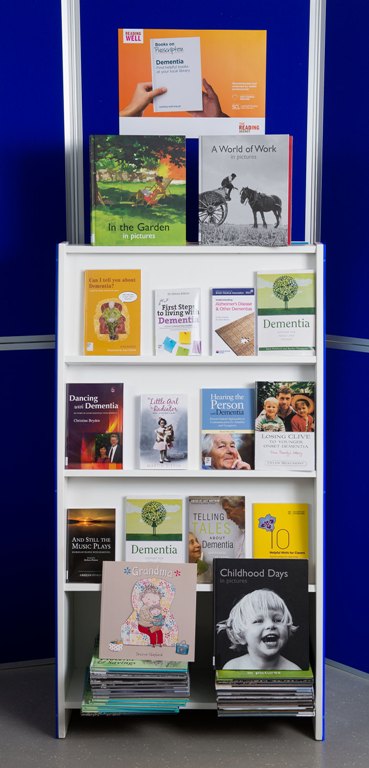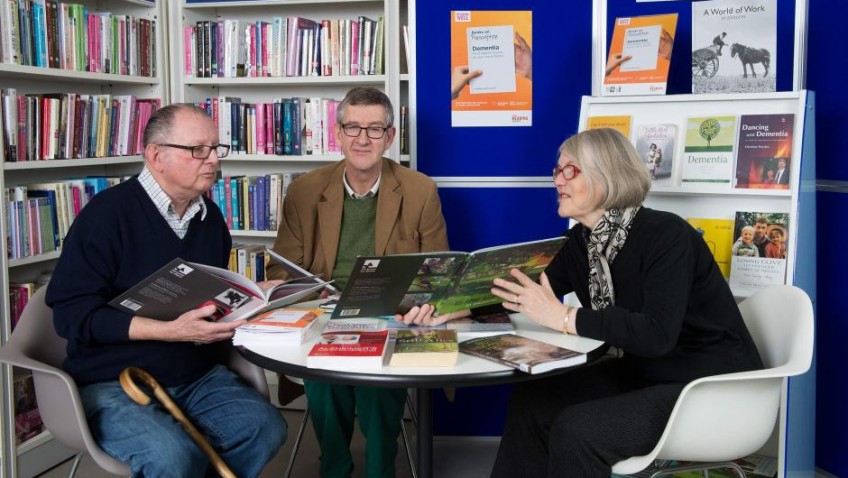Public libraries in England have launched their latest Reading Well Books on Prescription scheme to support people with dementia and their carers it is announced today. The ground-breaking scheme, which already helps over 275,000 people with common mental health conditions feel better through self-help reading, is now turning its attention to the enormous need for quality-assured support for dementia care in the UK.
Launched in June 2013 as part of the Universal Health Offer for libraries, the first national Books on Prescription scheme in England supports people with book based therapy for common mental health conditions available from public libraries. It has played an important role in helping to meet the huge need for mental health support. In a very successful first year, Reading Well Books on Prescription has been endorsed by the public as well as by GPs, mental health professionals and government ministers as a helpful community-based mental health service.
 Building on this success, Reading Well Books on Prescription for dementia will be available in public libraries from February as part of a national library strategy to support the development of dementia-friendly communities and build understanding and awareness of the condition.
Building on this success, Reading Well Books on Prescription for dementia will be available in public libraries from February as part of a national library strategy to support the development of dementia-friendly communities and build understanding and awareness of the condition.
Research shows that dementia presents a key national health challenge with a profound social, personal and economic impact on the estimated 850, 000 people in the UK living with the condition, as well as their carers and families.[1] The new scheme will also help the many people living without a formal diagnosis, who may be worrying about symptoms and wanting to find out more.
Improving dementia services and quality of care is a key priority of the Prime Minister’s Dementia Challenge and with the new scheme health professionals will be able to recommend helpful reading to support people with dementia and their carers. People can also self-refer using the booklist to borrow titles for free from their local library. At a national cost average of £1 per person, Reading Well Books on Prescription is a cost-effective way of delivering community-based dementia care and support.
The 25 titles on the Reading Well Books on Prescription for dementia list have been recommended by health experts as well as people with lived experience. The list includes a range of books offering information and advice about dementia and normal aging, support with living well after diagnosis, practical advice for carers, personal accounts, and suggestions for shared therapeutic activities.
The list is unveiled this afternoon at the official launch at the Wellcome Trust supported by Minister of State for Care and Support, Norman Lamb and Minister of State for Culture and the Digital Economy, Ed Vaizey.
Norman Lamb, Minister of State for Care and Support, says: “Dementia can be devastating and it’s vital people have as much information as possible so that they can live well with the condition.
This is a fantastic project which has already helped thousands of people with mental health conditions and I hope the new dementia scheme will be just as successful in giving people and their families access to valuable information and support.”
Ed Vaizey, Minister of State for Culture and the Digital Economy says: “Modern libraries are an important feature of our communities, valued places where people can find advice and information that can help in all parts of life. It’s great to hear that library book loans in this incredibly innovative scheme have doubled, and the new dementia scheme is an exciting development which I am sure will be just as successful.”
The scheme is delivered by independent charity The Reading Agency, the Society of Chief Librarians and local library services with funding from Arts Council England.
Ciara Eastell, Society of Chief Librarians and Debbie Hicks, The Reading Agency, say: “Reading Well Books on Prescription for dementia means that public libraries will play a significant role in helping to build dementia-friendly communities. The scheme works within NICE guidelines for dementia care. It provides quality assured information and advice, support following diagnosis and with early memory loss, practical and emotional help for carers and suggested activities to help people remain active and independent for as long as possible. We are delighted to be working together with health partners to deliver this exciting development in libraries’ health offer”
Reading Well Books on Prescription for dementia is supported by Alzheimer’s Society, British Association for Behavioural and Cognitive Psychotherapies, British Association for Counselling and Psychotherapy, The British Psychological Society, Carers UK, Dementia UK, Innovations in Dementia, National Association of Primary Care, NHS England (IAPT), Royal College of General Practitioners, Royal College of Nursing and the Royal College of Psychiatrists.
Dr Charles Alessi, Public Health England Dementia Lead, says: “Library health interventions such as Reading Well Books on Prescription will add significant value to existing dementia care as a useful support for health professionals and the general public. A dementia diagnosis without adequate and timely support for patients and carers can be a traumatic and disorientating experience leaving people feeling lonely and excluded from their community. Libraries and schemes such as Reading Well have a key role to play in providing help in a supportive and non-stigmatised community space.”
Keith Oliver, a former head teacher diagnosed with dementia in 2010, helped with the development of the core book list. He says: “In my first two years after diagnosis I had a great drive to read as much as I could by way of factual manuals, first hand experiences and fiction relating to dementia in order to better understand what was happening to me, and to reduce the fear and confusion I, as someone experiencing this disease in my mid 50s was experiencing. I totally commend this scheme for helping those who are sharing this journey with me either as people living with dementia, as carers or as professionals either in library services or the health/voluntary sector.





